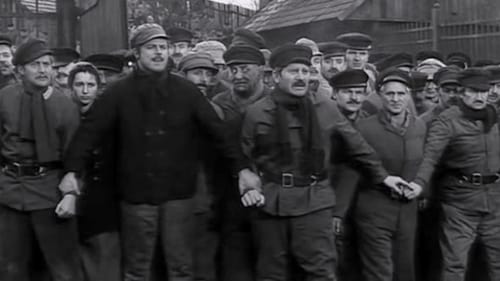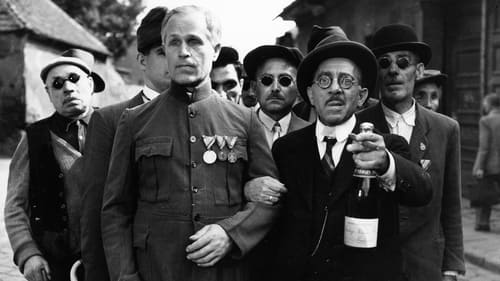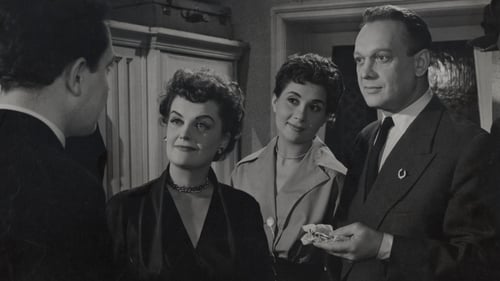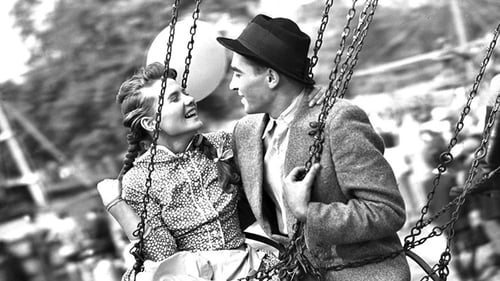
The satiric film is a dramatic-ironic picture of the Hungarian intellectuals in the seventies. Ebes, whose art has been awarded for its merits conglomerating folk features with modernity, can hardly believe that from his parents, old friends, and the sons of the people he did not even receive a telegram of congratulation.

Öreg festõ
A young man spends his last three nights with his lover before his army regiment is ordered to war. When he deserts his unit to return to her side, he discovers the woman he loves is gone, and he is interrogated by the police when he learns his lover is a communist agent. The two finally are reunited at the police station where the embarrassed man denies ever knowing the accused woman.

Boltai György
On the novel by Mór Jókai. The first half of the XVIII century. Several decades of life of a noble family Karpati.

At the beginning of the thirties the sour, boring life of the Hungarian small town is enlivened by a charity action: with the lead of the beautiful wife of the attorney funds are raised for the orphans.

Tóth Mihály

Stevenson, the famous English criminal expert visits Hungary with his family. While he is chairing a conference on criminology, infamous art treasure robbers steal the golden herm of Saint László. Suspicion is cast on the Stevenson children.

Bonnemort

Józsi bácsi
Bene, tired of the professional battles of engineers and trying to escape a ship-wrecked marriage, asks to be transferred to the country. The gravest problem of the sandy region in Nagyalföld (Great Hungarian Plain) is the shortage of water. The tireless director of the local state farm asks for Bene's support, but the disillusioned man refuses him.

The film is a ballad about the dwellers of a block-of-flats in Angyalföld.

Antal Kárász
Daddy Kárász, the stakhanovist worker, complains in a television interview about the fact that his family, consisting of many members, cannot get a home on their own. Kéri, the chairman of the local authority, promises to help him on the condition that if he does not, they may move in to his villa at elegant Pasarét. Nothing happens, therefore the Kárász family takes Kéri by his word. From this time on, tumultuous scenes and frequent quarrels take place in the villa between the two families.

Dr. Radó

Dr. Sanda
Private inspector Hável happens to travel on the train which is attacked at Biatorbágy. His attention is drawn to a suspicious man, and in the next few days he confirms that it was indeed him who committed the crime. Yet the police accuses not the lunatic Marschalkó but the communists. Summary justice is declared.

Id. Benedek
On the eve of World War II, Major Benedek Zoltán is an embodiment of the service regulations in the army. He only discloses his feelings towards Anna, his brother's widow. An investigation is conducted in the regiment to identify Communists.

uncle Sanyi

Imre Csendes
October, 1956. Colonel lieutenant Szabó sends a platoon with the mission of calming the people demonstrating in the town. The platoon is lined up under the command of Lieutenant Csendes and the soldiers aim at the demonstrators. Szusza Kis changes sides, and Csendes is unable to shoot at his childhood mate. They withdraw.

Knézits, factory porter
The "sleepless years" in this propaganda piece by director Felix Marlassy occur on Csepel Island, an island south of Budapest that is home to an armaments factory. The factory workers are shown being exploited by imperialists, capitalists gone berserk, and fascists, more or less in that exact chronological sequence. The heavy-handed approach does much to undercut the belief that when socialism finally takes over, the lives of the workers are brought up to a human level. In this instance, audiences might prefer a more nuanced and subtle statement, no matter what the message.

Dr. Moviszter
The young maid, Anna starts to work for the noble Vizy family. Mrs Vizy is proud of the hard-working servant but doesnt treat her well. Her nephew seduces Anna with sweet words, but when leaves her as soon as she gets pregnant. The humiliations of Anna finally lead to a tragic ending.

Marci bácsi
Life is on in the old house of Vizváros. Kids play on the ground. The adopted son of the janitor, Matyi, is hopelessly in love with Juli. He would like to emigrate to America with her. She prefers Janó, the driver, a great womaniser.

In 1944, Feri Margittai escapes from the front, but his mother sends him away from home.

Galamb Máté
One day, Máté Galamb loses his faithful dog, Bogáncs, of the Puli breed. The runaway dog is found in the woods by the old, disillusioned acrobat, Dodó.

(as Maklári Zoltán)
On New Year's Eve in 1956 the artist couple, the actor János and the dancer Viki are hastily packing. While they are waiting for the car, which is to take them across the border, their entire life is replayed in front of their eyes.

Borbély
Cabinet crisis threatens in Futbólia, due to a series of lost matches. The head of state charges admiral Duca with the task, as a last chance, to get hold of the football star of the Hungarian team presently playing in Switzerland.

Manzák
A school teacher becomes a momentary hero after having rescued a stuffed-bird from a school incident.

Berci bácsi
Varsa engineer receives the Kossuth award for his excellent work. His career once began at the family enterprise of his wife, so the woman invites her relatives for a dinner party.

Bölcs
The tyrannical king is afraid of his people. He can only find peace if everyone wishes him well when he sneezes. Catchpoles raid the country and give orders what the king wants.

In a rural scenery in the throes of difficult changes lives a humble but promising young farmer girl called Mari Pataki. Her father forbids her from seeing the man she loves. The father, above all preoccupied by work on the fields and prospective wealth, decides to give his daughter in marriage to an old but rich man with whom he does business. Land marries land, he says. This seems to be the unyielding rule of the Hungarian peasantry. But the young lover is ready to stand up to any challenge to keep Maris love.

Varga

In the story which takes place at the beginning of the century Károly Bauer pupil experiences a series of everyday failures during twenty four hours in the family, on the street and at school.

1790, the county of Szerém. József Hajnóczy, a democrat and a reformer is deprived of his position as vice-steward of the county because he is not born a nobleman.

Professor Varga
The young worker Tóth Gáspár gets into hospital with stomachache. During the night his state is worsening. The doctor on duty, Málnási does not attend the patient despite the call of the nurse, for he spends the night with nurse Margó.

Sándor Peczöli
The top management of the co-operative in the rural community at Lake Balaton goes on coaches everywhere to irritate Mrs. Peczöli, the snobbish wife of the only individual farmer. Peczöli would readily join the co-operative, should it not oppose his apple improving experiments.

An engineer from the city inherits an old, run-down mill, which is adjacent to a castle belonging to a young, attractive and spoiled woman named Marta - for who he falls in a heartbeat. Produced in 1941.

Professzor

József Bem
March 15, 1848; the revolution breaks out in the town of Pest. Yet at café Pilvax, in among he revolutionary youth, there is the informer of the imperial court as well. Hearing the news of the attack led by Jellasics, the inhabitants of the villages pour into the national army, and Hajdú Gyurka also escapes from his landlord. Petőfi is there at the camp of the revolutionaries, raising them to enthusiasm with his poetry.

Pál Boda

Kis papa (as Maklári Zoltán)
Kis Katalin and Varga Jóska are getting married. During their honeymoon they are preparing plans for the future. Katalin, however, seems to lag behind both in her studies and the work competition, becoming a couch potato version of a wife. Jóska, instead of trying to help, does nothing else than his work.

Imre Hegyi
In 1905 Hungary, a young village woman has just undergone a marriage to the spoiled son of a man to whom her father is indebted, in order that the debt be cancelled, only to be spirited away by her true love, a young peasant, by whom she soon becomes pregnant. Together they attempt to find a way to buy up her father's debt and also pay for a divorce from her husband, against various odds.

Bálint Antal, a Makkhetes tulajdonosa
In a small town in the countryside, the election of the president of the restaurant trade association is under way. The two rivals, Dénes Kövi, owner of the elegant Korona restaurant, and Antal Bálint, owner of the staid Makkhetes restaurant, are putting all their eggs in the basket for the title. Taking advantage of this situation, Pál Balázs, who has become the manager of his crippled painter friend, has a portrait commissioned with Dénes Kövi.

Kosztanovics

The film is the simultaneous portrayal of the wedding ceremony and honeymoon of a city and a country couple.

Patikus

Berci, Orbói inasa
Pataky Elemér arrives in the capital as a victim in his niece's divorce case. Having to meet the lawyer dr. Orbói István is, however, an alibi in an effort to get away from his quarrelsome wife, and to have some fun at the same time. He takes the lawyer with him.

After even his seventh fiancée dismisses him, Pali, longing for marriage and four children, falls in love with a Siamese diseuse and decides to marry her.

Ferenc Géza, ideggyógyász

Levendula Kajetán
In Luxoria Prince Igor is preparing to accede to the throne and choose his wife on his 24th birthday. The mother Duchess's candidate is Duchess Xenia, but Igor loves Annie, the soap-maker's daughter.

Új rokon

János Háry, the old veteran is telling his stories in the pub without end.

Kocsmáros
Kovács, chief cashier, is celebrating the 30th anniversary of his school-leaving exams at the grammar-school. He takes his friends to a night-club.

Kovalszky arrives at the Danube-Bank Hotel as a foreign gentleman. Two members of the staff, Miklós, the waiter and Anna, the house-maid are planning their life together. Kovalszky makes passes at Anna.

Nothing new under the sun. The famous 'Love Story' is only a faint reminder of the most successful pre-war Hungarian film. The relationship between the painter and the busy girl, as well as the third one, still holds surprises for us today.

Varga
Gábor, a doctor, fights his own battle to improve the welfare and health of the village. In his fight he is assisted by sister Jolán, member of the green cross.

végrehajtó
Mrs. Takács, a widow and a postmistress living in the country, is about to marry her two daughters.

Mujkó cigány
Venice Film Festival 1940

Csupori, intéző

Dániel, Karády inasa
The landowner, János Karády, is knocked down and robbed on the highway. He comes to in the shabby clothes of one of the robbers. Thirteen pretty young girls take care of the young man thought to be a poor vagabond.

Tokody Balázs

Mihály
Péter Ilosvay and Lina Vásárhelyi are wife and husband, but don't come along with each other. After the divorce they go on living under the same roof for they are unable to agree on the common wealth.

Ilonka Ernő

Kozsehuba
Another winner from Hungarian director Ivan Szekely (aka S.K. Seeley and Steve Sekely), A Nosty fiu Esete Toth Marival was released in English-speaking regions as I Married for Love. Feri Noszty (Paul Javor) is a handsome but irresponsible Hussar officer who prefers a life of wine, women and song to his military responsibilities. Unwilling to bow to family pressure, Feri refuses to marry heiress Mary Toth (Eva Szorenyi) for her dowry alone. But Mary falls in love with the prideful Feri, and to win his affections she poses as her own poverty-stricken maid. Based on a novel by Kalman Mikszath, A Noszty Fiu Esete Toth Marival was filmed simultaneously in Hungarian- and German-language versions.

Márton
András and Rózsi have been engaged for years now, but, given the absence of her certificate of baptism, they cannot get married.

Pénzbeszedő
Gitta is 20 years old, a girl with modern attitudes, who is courted by Ferenc Fekete. Not particularly liked by Gitta's parents, especially her old-fashioned father, Fekete dates Gitta in secret.

Sergeant György Szabó

Kéményseprõ

Maxenpfutsch
Az Uj Foldesur (The New Squire) was based on a novel by popular Hungarian author Maurice Jokal, whose many works had previously been largely ignored. After the wars of 1848, a retired Austrian army officer "returns to the soil" as a gentleman farmer in Hungary in the 1850s. The old campaigner is the father of two daughters: One of the girls comes to a sad end thanks to the malfeasances of a handsome spy, but the other has a happier fate when she falls in love with a Hungarian POW. The underlying theme is brotherhood, as the formerly warring Austrians and Hungarians at last find a common ground. Az Uj Foldesur was nearly twice as expensive as the average Hungarian film -- but at $40,000, its budget was a drop in the bucket compared to a typical Hollywood production.

A közjegyző írnoka

Black
Remake of the English movie Ghost Train (1931, Walter Forde). Seven people are stranded for a stormy night at a remote, unmanned railroad station past which, every midnight, steams the "ghost" of a train which wrecked there 20 years ago.

Vasutas
It tells the story of Marie, an austerely beautiful young peasant girl played by the French star, Annabella. She is seduced beneath a flowering tree by the admirer of one of the daughters of the prosperous family for whom she works, becomes pregnant and is cast out.

Evergreen comedy about a typical parvenu, an ignorant transportation entrepreneur who has suddenly found himself very rich. Despite their humble origins, his wife strives to live a sophisticated lifestyle. When she engages a butler, Hyppolit, their whole life is turned upside down. It has remained one of the most viewed Hungarian comedies of all time: it is shown regularly and is still extremely popular

Sebestyén
Gábor Turi, the star of the Viennese Opera retires from the stage after he inherits a huge piece of land in Hungary with the stipulation that he can't continue his career as a singer.














































